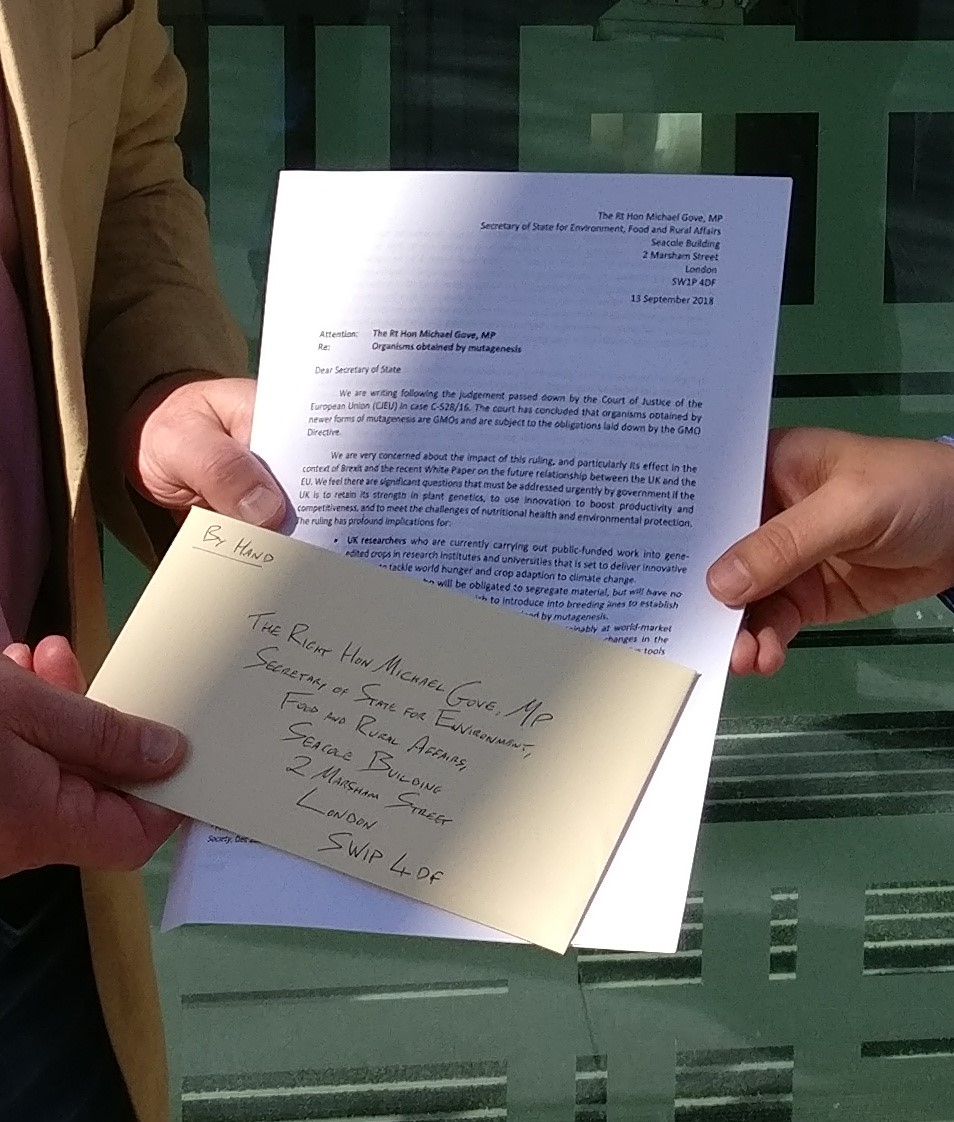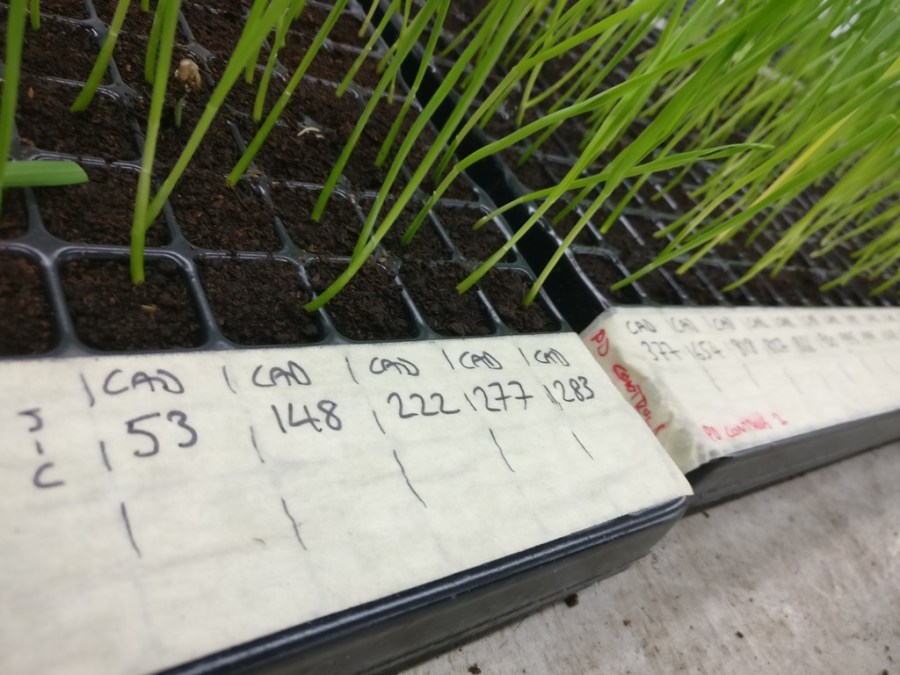Farming leaders and the UK agricultural industry have joined scientists in requesting the government urgently addresses how research and future use of gene-edited crops will be undertaken following an EU court ruling that classes them as GMOs.
A letter, signed by 33 research institutions, universities, plant breeders, crop agronomy companies and biotech multinationals, as well as industry, farmer and landowner organisations, was delivered to Defra Secretary of State Michael Gove on Thursday (13 September). The group collectively undertakes hundreds of millions of pounds of private and public-funded R&D into plant science every year, employing hundreds of scientists and crop specialists across the UK. The letter requests a round-table meeting involving all stakeholders and Defra to agree a clear way forward on research and future use of new plant-breeding technologies.

The letter has been signed by 33 UK organisations
“We feel there are significant questions that must be addressed urgently by government if the UK is to retain its strength in plant genetics, to use innovation to boost productivity and competitiveness, and to meet the challenges of nutritional health and environmental protection,” is the united message from the broad range of interests represented.
The move follows the shock ruling in July by the Court of Justice of the European Union (CJEU) that concluded organisms obtained by newer forms of mutagenesis are GMOs. This ruling went against the recommendation to exempt them, made by the EU Advocate General in January. It also differs from the position taken by other global authorities, such as those in the US and China, that they should be treated as bred by conventional techniques. Defra has since reiterated its view that “gene-edited organisms should not be regulated as GMOs if the changes to their DNA could have occurred naturally or through traditional breeding methods”.
As Brexit approaches, the industry group has urged Defra to continue to take a science-based approach to regulation. “Specifically, we ask for clarification on how the UK government’s support for innovation in plant breeding can be consistent with the common rulebook approach as we currently understand it. Both public and private sectors need to understand what realistic opportunities there now are for the UK to create fit-for-purpose, science-based and enabling regulation of plant biotechnologies,” says the letter.
Deep and broad concerns
The views expressed in the letter were drawn together by CPM editor and Oxfordshire farmer Tom Allen-Stevens, working with the NFU. “It was while researching some editorial, following the CJEU ruling, it became clear just how deep and broad are the concerns felt by many across the whole industry,” he said.
“Having been fortunate to have a brief glimpse into the research undertaken in this field, I’m spellbound. But as a farmer myself, I’m greatly concerned that as a result of this ruling, the fruits of this valuable research may never reach my farm, and that research into gene-edited crops in the UK may cease altogether.
“As a journalist, it’s my role to inform as many other arable farmers across the UK as I can. And as the current chairman of Oxford Farming Conference, I felt compelled to bring together all those with interests in this area to try to engender positive change.
“What amazed me when putting this letter together was the readiness of these organisations to voice their concerns and how united they are in how they feel the CJEU ruling will jeopardise opportunities to find solutions of real benefit to society – in 20 years of journalism, I’ve never known such a common chord struck by such a wide representation.”
The 33 signatories of the letter are: John Innes Centre, Rothamsted Research, NIAB, James Hutton Institute, Aberystwyth University, The Sainsbury Laboratory (Norwich), Quadram Institute, Earlham Institute, Professor Denis Murphy, Professor Ian Crute, National Farmers Union, Tenant Farmers Association, Country Land & Business Association, Linking Environment And Farming, RASE and Innovation for Agriculture, British Society of Plant Breeders, DSV-UK, Germinal, Limagrain UK, RAGT UK, KWS UK, Elsoms Seeds, HL Hutchinson, Agrovista, Frontier Agriculture, Agrii, ProCam, Syngenta UK, Bayer, BASF Agricultural Solutions, Corteva Agriscience, Agricultural Biotechnology Council, Agricultural Industries Confederation.
The letter can be viewed by following this link.
Round-table discussion
Among the specific issues raised, which members of the group wish to address in a round-table discussion, are:
- How research into newer forms of mutagenesis can progress in the UK when the costs associated with conducting field trials under GMO regulations are extremely restrictive to research institutes and also to small biotech companies.
- Whether UK regulation of crops obtained by mutagenesis should be product-based, as they are in other parts of the world, such as Canada, rather than methods-based, as defined by the CJEU ruling.
- How the current legal framework for UK plant breeders can be adapted to meet the requirements of the CJEU ruling. There are no means of distinguishing nor testing material they wish to introduce into breeding lines, that can be drawn from international sources, to establish whether it originates from an organism obtained by mutagenesis.
- The regulation of related research, such as RNAi technology, which would have direct benefits in relation to resistance management, in particular with regards pest control.
- Appropriate co-existence measures to balance the needs of the majority of the UK industry with those of the organic sector in particular, that currently represents 3% of land farmed in the UK. Researchers are keen the UK continues to retain its strength in gene-edited plant research and explore the potential to deliver innovative solutions to tackle world hunger and crop adaption to climate change. The Soil Association and other groups have stated they support the CJEU ruling and wish to bring to market food grown without the use of newer forms of mutagenesis.




